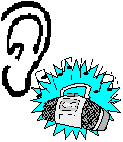French Level 1
Unit 8: Leçon 1b

|
Verbs Ending in -ER
|
Bonjour! Luc has given you the beginning of what is going to be the most important information in this course. As you come to know and understand the correct usage of these "-er" verbs, you will actually be able to express yourself "en français!"
Remember that in the last leçon, Luc instructed each of his three friends to share two activities that he or she likes to do followed by one activity that he or she doesn't like to do. Let's take another look at the three phrases that Gille gave us:
 Track 64 Track 64

|

|

|
|
J'aime manger des pizzas.
|
J'aime écouter la radio.
|
Je n'aime pas parler au téléphone.
|
Let's take a closer look at these sentences and take them apart to determine their meaning.
We will begin with the word, "J'aime". In each of the first two phrases, "J'aime" means, "I like" in English. This word is a contraction of two words, "Je" and "aime". At this point you may be wondering, "Why do we make these words into a contraction? Why not just say, "Je aime"". The reason we use a contraction in this instance is that the pairing of these words together simply sounds WEIRD. They sound like "zuuuuuhem". Notice that the two vowels, E and A together sound long, drawn-out and awkward. Forming a contraction combining these two words together (by removing the "E") makes the word much easier to say AND it sounds better too!
Now, let's take a look at the third sentence on Gille's list:
 Track 65 Track 65

|
|
Je n'aime pas parler au téléphone.
|
The words, "Je n'aime pas" at the beginning of Gille's last sentence mean, "I don't like" in English. See those little letters around the word "aime"? Those are the words that make verbs negative. These words are "ne" and "pas". In the sentence, "Je n'aime pas", we have removed the letter "e" from the word, "ne" and replaced it with an apostrophe, turning it into a contraction. "Why?" you ask. For exactly the same reason that we removed the "e" from "Je" when we placed it with "aime" and made the contraction "J'aime", because without the contraction of these two words, THEY SOUNDS WEIRD TOGETHER TOO! I'll spell out the sound for you: "zuh nuuuuuuhem pah" If you say this phrase as I have just shown you to a French person, he or she would giggle and point at you until your face turned red (depending on the natural color of your skin, of course), AND THEN they would giggle about that! Remember, if you don't want people to giggle at you, NEVER FORGET THE CONTRACTION! NEVER! The correct way to say this sentence is "zuh nem pah". Practice it! When you are ready, continue.
We'll now take a look at the remaining parts of each of Gille's first sentence only.
 Track 66 Track 66

|
|
J'aime manger des pizzas.
|
You already know that the word "J'aime" means "I like" in English. You also know that "des pizzas" means, "some pizza" in English. The French word that we are concerned about in the above phrase is the verb "manger" which means "to eat" in English. Since you will need to know the meanings for each of the verbs contained in each of the phrases describing Luc's friends, I have made a chart containing each of these words. This will be much faster and WAY easier than going through each phrase seperately!
 Track 67 Track 67
LES PHRASES DE GILLE
|
J'aime manger des pizzas.
|
I like to eat some pizza.
|
|
J'aime écouter la radio.
|
I like to listen to the radio.
|
|
Je n'aime pas parler au téléphone.
|
I don't like to speak on the telephone.
|
LES PHRASES DE VICTOIRE
|
J'aime danser.
|
I like to dance.
|
|
J'aime nager.
|
I like to swim.
|
|
Je n'aime pas étudier.
|
I don't like to study.
|
LES PHRASES DE MARIE-CATHERINE
|
J'aime chanter.
|
I like to sing.
|
|
J'aime jouer du piano.
|
I like to play the piano.
|
|
Je n'aime pas regarder la télé.
|
I don't like to watch t.v.
|
*Note that in the last phrase the literal translation for "la télé" in French is "t.v." in English. The French word for "television" is "la télévision" pronounced: "lah tay lay vee zeeoh".
In the next leçon, Monsieur LeBrun will give you some new vocabulary words that deal with sports!

|